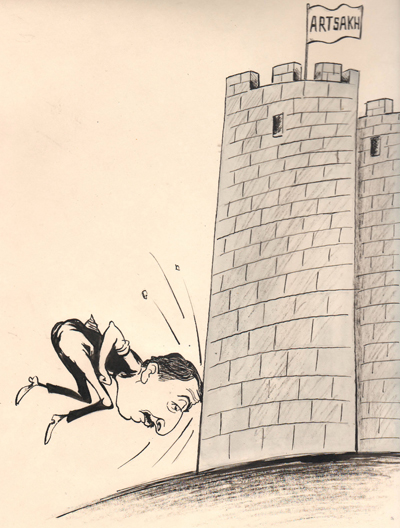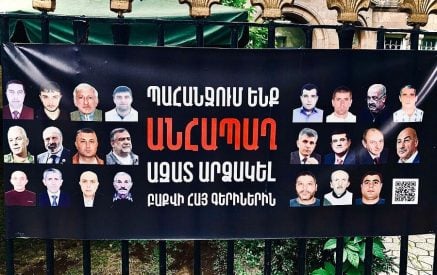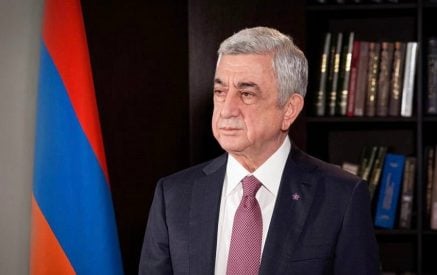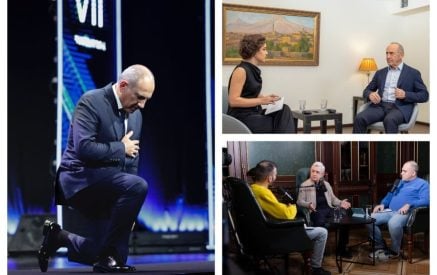Under the West-Russia tough confrontation, some experts expected crisis in the Karabakh settlement process. It is known that the international community represented by the OSCE Minsk Group three-chairmanship was displaying a specific kind of behavior in the Nagorno-Karabakh conflict by limiting to mediation mission and avoiding pressure. The peculiarity of this behavior is that at least the co-chair countries, despite various contradictions, were demonstrating unprecedented unity in the Karabakh settlement process.
During the past year, the ghost of the “cold war” appeared in Europe, and many were rightly thinking that the global contradiction between Russia and the West would have a projection on the Karabakh settlement. Those who share this view made a reference to the key events of the past year: on the 20th anniversary of the ceasefire, American co-chair James Warlick’s speech in the “Carnegie” foundation, which was presented as a US (separate) position, organization of separate tripartite meetings at the level of the presidents: first by the initiative of Vladimir Putin, then by John Kerry and Francois Hollande. These and other events suggest that mediators have lost their once uniformity, and each of them runs its own game. The unproductive summit of G20 held in Brisbane was also in favor of this viewpoint. Unproductive, primarily in the context of the Nagorno-Karabakh conflict.
The point is that in the last 5 years, this or G8 platform was used for the adoption of the statements by the three-chairmanships at the presidential level. In the event of actual non-existence of G8, the Brisbane silence became an additional argument for the skeptics. Everything changed last week. On December 4, under the OSCE Foreign Ministerial Council session passed the joint statement of the Minsk Group Co-Chairing countries’ delegation leaders, Sergei Lavrov, John Kerry and Harlem Désir, respectively. Although the content of the statement is extremely important, however, it was first and foremost fundamental, in its form. OSCE Minsk Group co-chairs again display of unity and despite the controversies, they maintain the tradition of making a statement at the OSCE Ministerial Committee platform. That is to say that, in this sense, Russia and the West seem to stand up above the momentary confrontation. Instead, official Baku’s persistence in the Karabakh settlement process becomes even more pronounced.
First of all, provocations and their unprecedented nature implemented throughout the past year, then, the inhuman and anti-humanistic posture in the period followed by the helicopter incident, and eventually, Aliyev’s regime behavior in the current international state of affairs. Last week, Ilham Aliyev, in his interview to “Russia” TV channel, admitted that the developments in the oil market will force them to reconsider the state expenses by keeping only the “priority directions” immune. Ilham Aliyev made this statement after it became clear that the country’s military expenditures would again be extended by reaching 4 billion dollars.
Read also
In fact, the war for Aliyev remains as a primary direction. And this is in the background of the Co-Chair countries’ next statement that there is no alternative to peaceful settlement of the conflict, and the parties shall undertake strengthening the atmosphere of mutual trust. It was noteworthy that for this time, Armenia and Azerbaijan did not join the statement passed at the OSCE Ministerial Council session. Moreover, the two countries’ foreign ministers meeting was canceled. Even James Warlick expressed regret on this occasion. In the interview with the journalists, Edward Nalbandian clarified that the Azerbaijani side is to blame. Baku rejected and rejects the mediators’ proposals, explained Armenia’s Foreign Minister, also said that with their statements, the co-chairs address “delicate” accusations to Azerbaijan.
While Edward Nalbandian was interpreting the meaning of the statement by the co-chairs, Ilham Aliyev, in this interview, assured that “Armenia does not want peace.” His explanation is that the subject of the conflict are the “Azerbaijani lands”. Instead, the Armenian side and it seems also the mediators tend to think that the subject of the conflict is a totally different and includes, first of all, the future status of Nagorno-Karabakh. Anyway, with the statement of Dec. 4, the co-chairs emphasized that “the sides must admit that the bases of comprehensive settlement are the elements and principles, which are highlighted in the joint statement by presidents of Russia, the United States and France”.
As it is known, the quintessence of these principles and elements makes the will of the population of Nagorno-Karabakh expressed in the time of peace fundamental. Aliyev emphatically rejects this idea and arms. Baku seems has not learned lessons of the previous war and they hope that the people of Artsakh would display a different will during the non-peacetime. Don’t worry. What is important is that the force centers refrain from entering into a confrontation on Karabakh conflict, which is reflected by their unity. And this means that the will of Artsakh people is the core of the settlement, regardless of Aliyev’s persistence.
Edgar KHACHATRYAN
P.S. The article was already ready for publication, when we received information that Azerbaijan once again had made an attempt of unsuccessful subversive penetration. This probably should be associated with the December 4 statement.























































